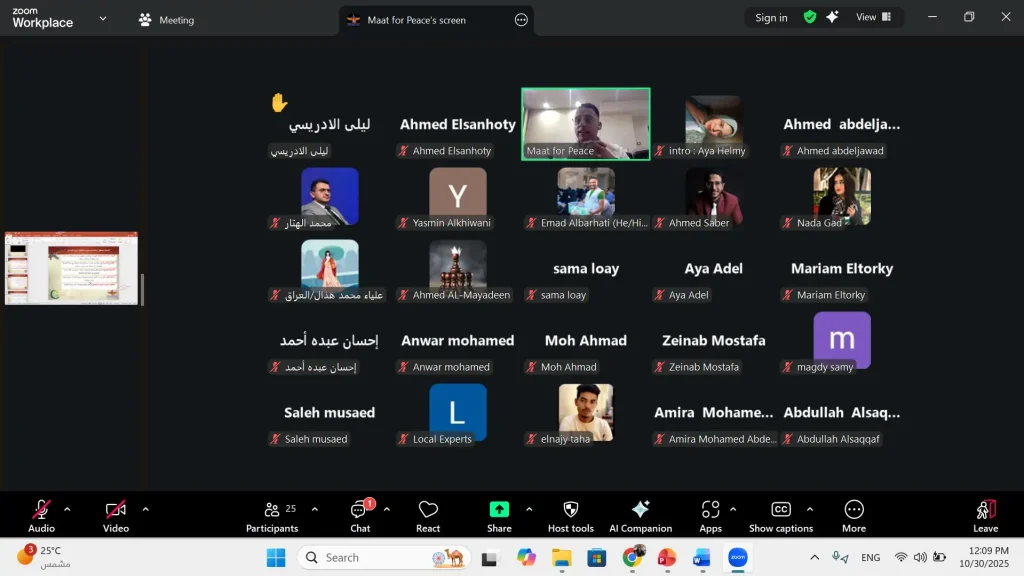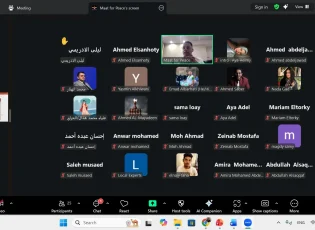She is no longer the lady whose image has been entrenched in everyone’s minds who sits at home lost between kitchen utensils and her children are often overburdened by requests and she is bad looking. It is about raising children only, which is to participate in life and public work and contribute to local decision-making, which is no less than men’s capabilities, but sometimes surpasses him. History is full of successful female models who have been able to prove their abilities in light of the domination of men over many decision-making centers. This is what was produced by the fifth round table held by Maat for Peace, Development and Human Rights in cooperation with the Al-Amal Association for Social Welfare within the framework of the project to empower women in governance in the Egyptian village, which aims to enhance the participation of women in local governance in the Egyptian village, Wusul, by building women's capacities to Running in local elections and raising awareness of the importance of women's participation in local government mechanisms and building effective community mechanisms in support of the fair representation of women in elected local popular councils, on Sunday, March 13, 2011 at the headquarters of the Local People's Council of Mina Al Qamh Center and City in Sharkia Governorate, in the presence of more than 30 popular and local leaders In the center, which varied between local leaders, doctors and journalists, as well as members of localities. The table dealt with a number of basic problems that prevent women from participating in local decision-making in the Sharqawi community. Although Sharkia Governorate is one of the governorates that witnessed a high turnout by women to run for the last People's Assembly elections in 2010, this turnout is less towards the popular councils. This is what the leaders participating in the table tried to explain and suggest solutions for. They also explained that most of the elections in Egypt and in the localities in particular are considered appointments, nothing more than that, which was typical during the period of the former ruling National Party, where the party used to choose the only female member in the village councils consisting of 24 members, and sometimes the party found it difficult to find these Women because of the reluctance of the majority of them to participate in those councils. The participants also discussed the most important reasons that led to this great reluctance in the past period and how to avoid it in the next phase in Egypt, which they summed up in: Lack of qualification and women's loss of self-confidence as a result of the domination of men throughout the years that have passed since the electoral process and decision-making and not allowing women to participate and contribute in What helped this is the negativity of many women and their lack of ambition. Women in the countryside willingly accept discrimination against them. The round table came out with a number of recommendations to improve the status of women and increase their representation and presence within centers and mechanisms of local decision-making, the most important of which was holding a number of training courses for women in all villages in the Minya Al-Qamh Center, especially as Egypt is on the verge of more than 3 Faisaliah elections in its history on election culture and awareness. Of the importance of the constitution and their legal rights. Some women leaders also suggested that all village units in the Mina al-Qamh center, which number 11 village local units, cooperate in implementing developmental and awareness-raising projects for women based on the fact that if women are economically empowered, this may contribute significantly to increasing their political participation, and this is in parallel with a number of Seminars and trainings for women about local elections, their role in them, how to choose candidates based on their electoral programs, and how to monitor the implementation of those programs. At the end of the table, some participants suggested activating the role and mechanisms of the Board of Grievances, which researches the problems and violations that people in society are exposed to, especially since the majority of affected women are women because they are the most vulnerable groups and sense the problems of their society.
shortlink: https://maatpeace.org/en/?p=30581











